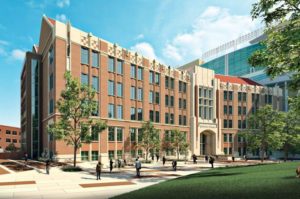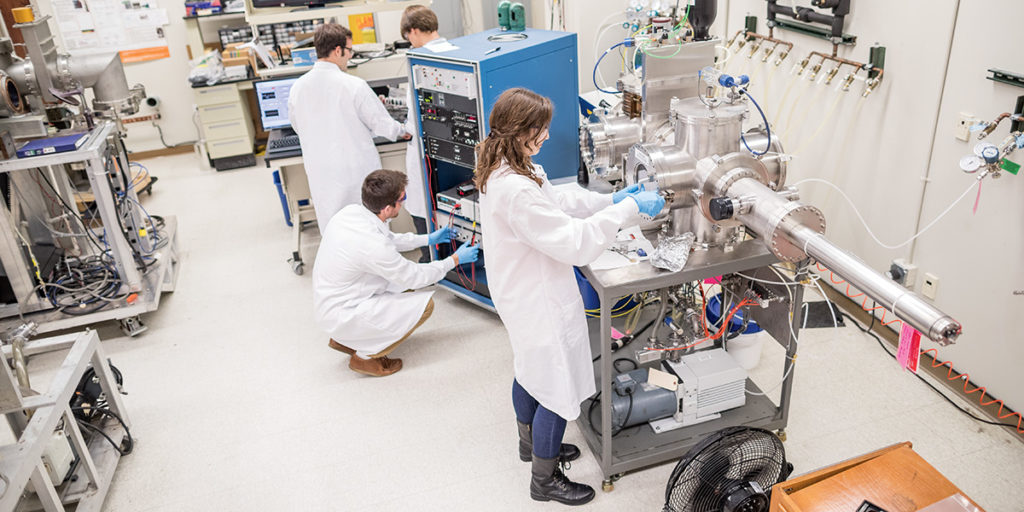2021 ASEE UT NE Rankings
- #1 in PhD student enrollment
- #2 in BS student enrollment
- #2 in total student enrollment
- #2 in BS degrees granted
- #4 in federal expenditures per faculty
- #4 in federal research expenditures
Brief History
- Department founded in 1957, making it the first Department of Nuclear Engineering in the United States.
- Produced over 1,400 graduates in the past 60 years.
Faculty and Staff Profile
Faculty
- 18 tenure/tenure track faculty
- 4 assistants
- 6 associate
- 8 full
- 3 part-time emeritus
- 1 open faculty search
- 7 full time research faculty
- 2 UT-ORNL Governor’s Chairs
- 2 Professors of Practice
- 3 non-UT Joint Faculty
- 2 ORNL
- 1 Y-12
- 1 National Academy of Engineering Member
- 8 ANS Fellows
- 12 research faculty, 28 adjunct faculty
- 14 research scientists, 6 post-doctoral research scholars
Student Profile
2022–23 Graduates
- 92 graduates total
- 45 BS
- 38 MS
- 18 PhD
2023–24 Enrollment
- 359 total students
- 212 BS
- 47 MS
- 110 PhD
Graduate Student Support
- 14 UT fellowships (Chancellor, UT top 100, Tickle College)
- 17 graduate teaching assistantships
- 118 graduate research assistantships
- 22 external fellows (NEUP, NNSA, NRC, CIRE, CNEC, NNIS, GEM, IAEA)
New Engineering Complex
The department moved into the new $128M engineering complex in Fall 2021. It supports their groundbreaking research with 27 new nuclear engineering laboratories including shielded rooms for the graphite pile and Approach to Criticality facility along with vaults for a 9MV LINAC and a neutron generator driven Fast Neutron Source. This triples their physical footprint.

Research
$17.2 million in expenditures
Research Focus Areas
- Nuclear Fuels and Materials
- Nuclear Security
- Radiological Sciences and Health Physics
- Nuclear I&C, Reliability, and Safety
- Nuclear Fusion Technology
- Nuclear Fuel Cycles
- Advanced Modeling and Simulation
- Radiation Detection and Measurement
Academic Analytics Rankings*
- 4th in Scholarly Research Index**
- 4th in Articles Per Faculty, among Nuclear Engineering departments
*Among nuclear engineering departments
**scholarly research index combines publications, citations, funding, awards, and honors
Additional Facilities and Equipment
- Ion Beam Materials Laboratory
- Scintillation Materials Research Laboratory
- Radiochemistry & Nuclear Forensics Laboratory
- Data Acquisition & Instrument Characterization Laboratory
- Prognostics, Reliability, & Control Laboratory
- Micro-Processing Research Facility
- Institute for Advanced Materials & Manufacturing
- Parallel Computing ACF & Local Beowulf Clusters
- 85 MW High Flux Isotope Reactor
- Spallation Neutron Source
- Nuclear Safeguards Laboratory
- Radiochemical Engineering Development Center
- Low Activation Materials Development & Analysis
- Center for Radiation Detection Materials and Systems
- Titan Supercomputer (world’s third most powerful supercomputer)
- Y-12 National Security Complex
- Reliability and Maintainability Center
- Scintillation Materials Research Center
- Thompson Cancer Survival Center
- Consortium for Advanced Simulation of Light Water Reactors
- Provision Center for Proton Therapy
- Institute for Nuclear Security
